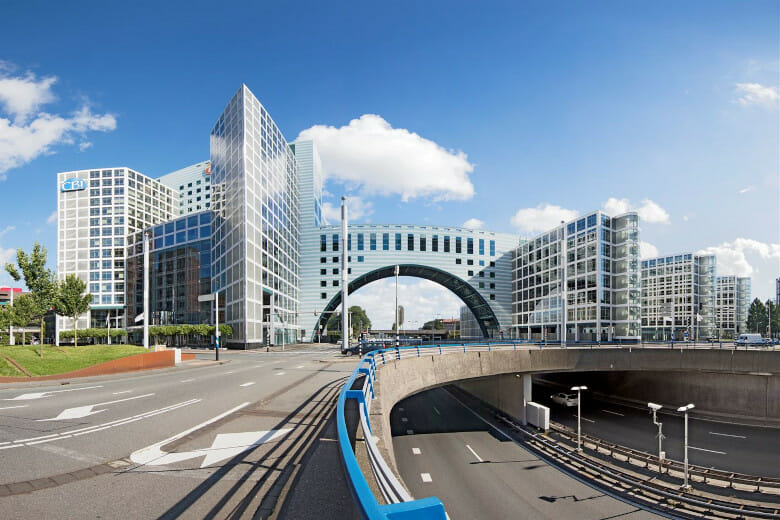
Cromwell European REIT’s portfolio includes Haagse Poort, a 68,500 square metre office property in the Hague
BlackRock Inc. has ceased to be a substantial unitholder in Cromwell European REIT (CEREIT) after selling down its stake in the SGX-listed trust, as Europe’s property sector faces growing headwinds and rising bond yields dampen the appeal of Singaporean REITs.
The US-based asset management giant sold 59,900 voting units of CEREIT, leaving BlackRock with 28.1 million total units, according to the REIT manager’s filing to the Singapore Exchange on 30 December. The transaction leaves BlackRock with 4.99 percent of the REIT’s total issued units, down from 5.01 percent previously, meaning the company no longer meets the 5 percent threshold to be considered a substantial unitholder.
Under Singapore law, substantial unitholders in a REIT must disclose their interest or change in interest in the trust’s voting shares. BlackRock, which owns roughly $60 billion in real assets globally, first emerged as a substantial unitholder in CEREIT in September 2021, when a filing revealed it had purchased for 382,400 units in the trust.
The purchase boosted BlackRock’s total unit holdings to 28.2 million, with its share rising from 4.96 percent to 5.03 percent. BlackRock’s share reached 5.88 percent as of March 2022, according to CEREIT’s 2021 annual report.
Sponsored by Australia-based global real estate fund manager Cromwell Property Group, CEREIT has a €2.6 billion ($2.8 billion) portfolio made up of more than 110 properties across Europe and the United Kingdom. The collection of real estate assets, comprising mainly light industrial/logistics and office properties, spans roughly 2 million square metres (21.5 million square feet) of lettable area.
Tough Road Ahead
Like many REITs listed in the Lion City, CEREIT, which debuted in November 2017, allows locally based investors to access growth opportunities overseas, bypassing the increasing competition for a limited pool of quality assets within the city-state.

Simon Garing, CEO and executive director of Cromwell EREIT Management
The REIT had record portfolio occupancy of 95.7 percent as of 30 September 2022, CEREIT’s manager announced in its third-quarter business update last November. Net property income was up 4.5 percent year-over-year, leading to 3.8 percent growth in income available for distribution for the first nine months of the year.
Despite this strong performance, the REIT’s manager cautioned that it expected transaction activity to slow down in the near term and that the focus would remain on asset and capital recycling rather than acquisitions.
“The rising interest rate environment may negatively impact cap rates and potentially offset some of the gains from higher rentals and occupancy on the overall portfolio valuation in 2023,” noted Cromwell EREIT Management CEO Simon Garing in a statement.
Fitch Ratings affirmed CEREIT’s long-term issuer default rating at “BBB-” with a stable outlook in mid-October, noting that the REIT benefitted from a measured growth strategy and a geographically diversified portfolio of properties that generate steady rental income.
However, the ratings agency expressed concern about the impact of an expected European recession in 2023 and forecast that the REIT’s revenue growth would be flat during the year, due to lower occupancy and lost rental income associated with the redevelopment of prime office properties in Milan and Rome.
CEREIT’s portfolio comprises mainly freehold properties in and around major gateway cities across 10 countries. The trust has a minimum portfolio weighting of at least 75 percent in Western Europe and at least 75 percent in light industrial/logistics and office assets.
Brisbane-headquartered Cromwell Property Group has a portfolio of more than 210 properties across Australia, New Zealand and Europe, with A$12 billion ($8.3 billion) in assets under management as of June 2022.
Trusts in Trouble
Share prices of Singapore REITs have plunged over the past half-year amid a sharp rise in interest rates and soaring inflation, which drives up real estate operating expenses. Rising yields on Singapore government securities have also provided an appealing alternative to REITs for risk-averse investors.
Volatility in share prices has made it harder for S-REITs to raise cash and prompted managers to focus on conservative strategies and opportunities to recycle capital, according to REIT executives who spoke at the Mingtiandi Singapore Forum in October.
The iEdge S-REIT Index published by the Singapore Exchange, which measures the performance of Singapore-listed REITs, touched 1,136 on 29 December 2022, down more than 16 percent from 1,355 nearly a year earlier. CEREIT’s share price dropped to €1.5 on 29 December from €2.53 a year prior.
Leave a Reply